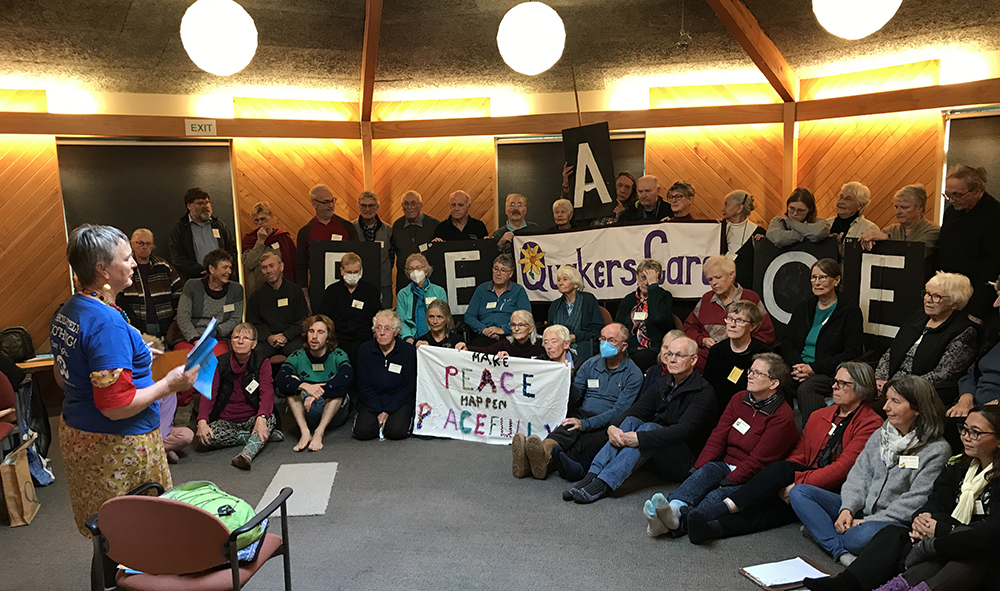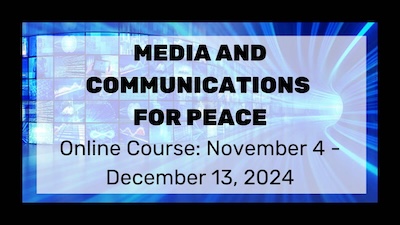
By Liz Remmerswaal Hughes, Vice President of World BEYOND War, May 23, 2023
Whanganui Quakers kindly provided the historic handcrafted peace banners saying (‘Quakers Care’ and Make Peace Happen Peacefully) and hand held wooden signs spelling ‘PEACE’ which were used for the Springbok Tour in 1981 and other peace demonstrations.
We recorded a video of the meeting which began with a mihi by Niwa Short, followed by 12 Quakers poignantly reading our updated Peace Testimony and concluding with the waiata ‘Te Aroha.’
This evolving event was a special reminder of the peace work Friends have taken part in over the decades and a timely reminder of the importance of our peace advocacy, which is as important as ever as our country’s military spending climbs ever upwards.
Statement on PEACE made by Yearly Meeting in 1987
We the Friends in Aotearoa-New Zealand send loving greetings to all the people in this country, and ask you to consider this statement, addressed to you, to which we all agree as one. The time has come for us to take an unequivocal public stand on the question of violence.
We totally oppose all wars, all preparation for war, all use of weapons and coercion by force, and all military alliances; no end could ever justify such means.
We equally and actively oppose all that leads to violence among people and nations, and violence to other species and to our planet. This has been our testimony to the whole world for over three centuries.
We are not naive or ignorant about the complexity of our modern world and the impact of sophisticated technologies – but we see no reason whatsoever to change or weaken our vision of the peace that everyone needs in order to survive and flourish on a healthy, abundant earth.
The primary reason for this stand is our conviction that there is that of God in every one which makes each person too precious to damage or destroy.
While someone lives there is always the hope of reaching that of God within them: such hope motivates our search to find non-violent resolution of conflict.
Peacemakers are also empowered by that of God in them. Our individual human skills, courage, endurance, and wisdom are vastly augmented by the power of the loving Spirit that connects all people.
Refusal to fight with weapons is not surrender. We are not passive when threatened by the greedy, the cruel, the tyrant, the unjust.
We will struggle to remove the causes of impasse and confrontation by every means of nonviolent resistance available. There is no guarantee that our resistance will be any more successful or any less risky than military tactics. At least our means will be suited to our end.
If we seemed to fail finally, we would still rather suffer and die than inflict evil in order to save ourselves and what we hold dear. If we succeed, there is no loser or winner, for the problem that led to conflict will have been resolved in a spirit of justice and tolerance.
Such a resolution is the only guarantee that there will be no further outbreak of war when each side has regained strength. The context in which we take this stand at this time is the increasing level of violence around us: child abuse; rape; wife battering; street assaults; riots; video and television sadism; silent economic and institutional violence; the prevalence of torture; the loss of freedoms; sexism; racism and colonialism; the terrorism of both guerillas and government soldiers; and the diversion of vast resources of funds and labour from food and welfare to military purposes.
But above and beyond all this, is the insane stockpiling of nuclear weapons which could in a matter of hours destroy everyone and everything that we value on our planet.
To contemplate such horror can leave us feeling despairing or apathetic, hardened or blasé.
We urge all New Zealanders to have the courage to face up to the mess humans are making of our world and to have the faith and diligence to cleanse it and restore the order intended by God. We must start with our own hearts and minds. Wars will stop only when each of us is convinced that war is never the way.
The places to begin acquiring the skills and maturity and generosity to avoid or to resolve conflicts are in our own homes, our personal relationships, our schools, our workplaces, and wherever decisions are made.
We must relinquish the desire to own other people, to have power over them, and to force our views on them. We must own up to our own negative side and not look for scapegoats to blame, punish, or exclude. We must resist the urge towards waste and the accumulation of possessions.
Conflicts are inevitable and must not be repressed or ignored but worked through painfully and carefully. We must develop the skills of being sensitive to oppression and grievances, sharing power in decision-making, creating consensus, and making reparation.
In speaking out, we acknowledge that we ourselves are as limited and as erring as anyone else. When put to the test, we each may fall short.
We do not have a blueprint for peace that spells out every stepping stone towards the goal that we share. In any particular situation, a variety of personal decisions could be made with integrity.
We may disagree with the views and actions of the politician or the soldier who opts for a military solution, but we still respect and cherish the person.
What we call for in this statement is a commitment to make the building of peace a priority and to make opposition to war absolute.
What we advocate is not uniquely Quaker but human and, we believe, the will of God. Our stand does not belong to Friends alone – it is yours by birth right.
We challenge New Zealanders to stand up and be counted on what is no less than the affirmation of life and the destiny of humankind.
Together, let us reject the clamour of fear and listen to the whisperings of hope.
Lest we Forget – Statement from the Religious Society of Friends (Quakers), Yearly Meeting of Aotearoa New Zealand, Te Hāhi Tūhauwiri, May 2014
On the eve of commemorations of World War I, Quakers in Aotearoa New Zealand are concerned that history is not reinvented to glorify war. We remember the loss of life, the destruction of the environment, the courage of soldiers, dissenters and conscientious objectors; we remember all those who still suffer the ongoing trauma of war. We also note the increasing use of scarce resources for war. In Aotearoa New Zealand over ten million dollars a day is being spent to maintain our armed forces in a state of ‘combat readiness’ (1). We actively support alternative processes for resolving conflict and violence both within and between nations. “We totally oppose all wars, all preparation for war, all use of weapons and coercion by force, and all military alliances; no end could ever justify such means. We equally and actively oppose all that leads to violence among people and nations, etc….








